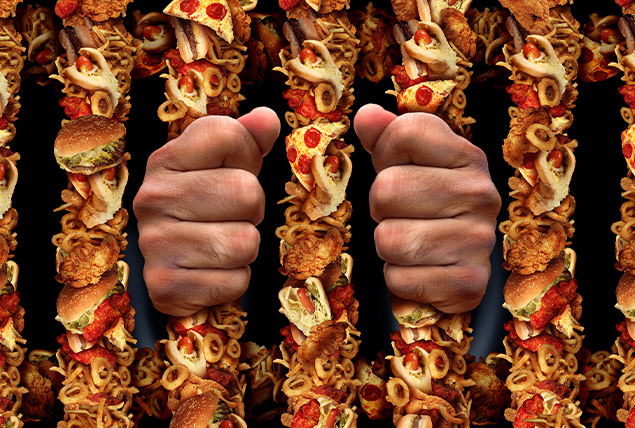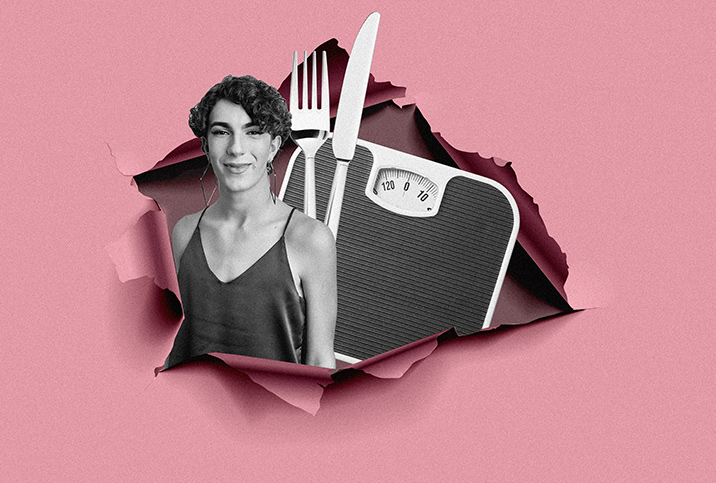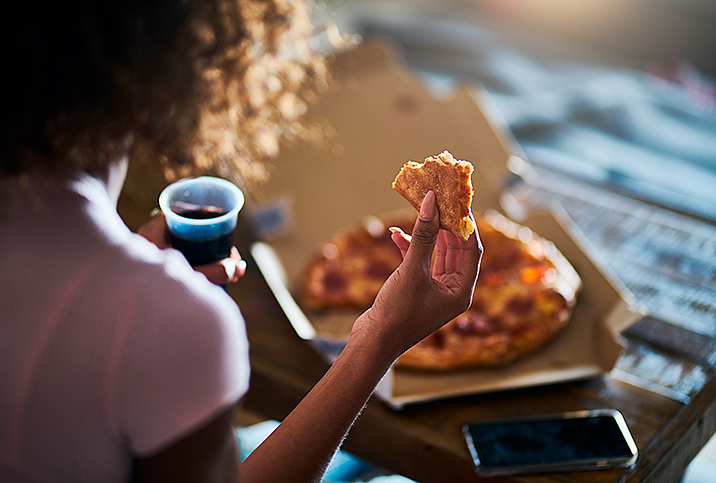Is Food Addiction Real?

Most first-graders quiver in their seats, eagerly awaiting the recess bell, a call to freedom and the chance to play.
But Shelly-Anne Mckay didn't dash out the door with her classmates. Rather, she hung back so she could loot her classmates' lunchboxes, stealing cookies and sweets. And it's not as if she didn't have any herself—her mother always packed dessert.
"It just wasn't enough," said Mckay, the CEO and founder of Healing Hive and a certified ICARE recovery coach based in Kelowna, British Columbia.
She may have needed food addiction help.
This is her earliest memory involving her thorny relationship with food, a problem that persisted through her teens and into adulthood. Often, it was characterized by overwhelming compulsive urges to eat, despite the consequences to her health and well-being.
"Over the past 30 years, I have tried so many different things to figure it out and achieve recovery," she said. "It wasn't until five years ago that I understood the genetic aspects and discovered research that shows food addiction is very real and on the rise."
Food addiction is a contentious topic
In 2009, more than 70 million American adults struggled with some form of "conditioned hyper-eating," according to David Kessler, M.D., a professor at the University of California, San Francisco and the former commissioner of the United States Food and Drug Administration (FDA).
A recent report from the University of Michigan suggested about 1 in 8 Americans older than 50 have a problematic relationship with ultra-processed food, which involves addictive-like thoughts and behaviors.
Food addiction is a contentious topic in the realm of health and wellness, though. Many experts argue the terminology is erroneous and the disorder altogether fictitious. Even Kessler stopped short of labeling it an addiction.
But many insist it's a bona fide condition.
First appearing in the scientific literature in 1956, food addiction has received increasing attention over the past several years in response to the prevalence of obesity and the ubiquity of highly processed foods.
In 2022, it entered the limelight with Darren Aronofsky's Academy Award-winning psychological drama, "The Whale." The film portrays an obese, reclusive English teacher, played by actor Brendan Fraser, who compulsively eats, despite obvious, life-threatening consequences. He seeks solace—or is it self-harm?—in food.
Regardless of whether food addiction is a faultless term, experts agree that associated behaviors have profound implications for a person's mental and physical health. These include an increased risk of excess weight gain and related problems, including:
- Diabetes
- Heart disease
- Insulin resistance
- High blood pressure
- Certain cancers
- Sexual health difficulties, such as erectile dysfunction (ED), low libido and infertility
Additionally, eating disorders frequently co-occur with mood disorders, such as depression and anxiety, which can further inhibit sexual and overall well-being. And as Aronofsky demonstrated—albeit as a part of a fictional entertainment—compulsive eating and its side effects can wreck one's self-esteem, confidence and relationships.
So what is food addiction and how can it be treated? Here's what eating disorder experts have to say.
Is food addiction real?
The term "food addiction" isn't listed in the Diagnostic and Statistical Manual of Mental Disorders, Fifth Edition (DSM-5). As a result, many experts argue it is not a medical condition, though it may be perceived as such.
"It is widely, though not unanimously, held by leading experts in the eating disorder field that food addiction is not a valid condition—at least, not in a physiological sense," said Cherie Miller, L.P.C.-S., a therapist specializing in eating disorders in Southlake, Texas.
The body cannot become addicted to food in the same way it can become addicted to substances such as drugs or alcohol, she said.
What's referred to as food addiction might more closely resemble a behavior addiction, such as ones associated with gambling or shopping. It also usually includes other issues with food driven by dieting or restriction, or emotional difficulties where food is used as a coping mechanism.
One issue with the term 'food addiction' is that people can't survive without food, and it's impossible to become addicted to something fundamental to survival.
Nonetheless, Miller said the effects of compulsive eating should not be dismissed.
"I would never minimize that a person can feel addicted to food based on obsessively thinking about food and struggling with intense compulsions to eat and feeling little control over those compulsions," she said.
Yes, the research is still in its infancy, but a growing body of scientific evidence indicates that ultra-processed foods, specifically, can generate changes in the brain that look very similar to those of people addicted to substances or gambling, according to Anne Marie O'Melia, M.D., a Denver-based psychiatrist and the chief medical officer and chief clinical officer at Eating Recovery Center.
"We have some rodent-based research that supports the concept that frequent or intermittent exposure to foods high in sugar or fats can develop into food consumption patterns that look a lot like a drug addiction both behaviorally and neurochemically," she said.
There have been studies on humans demonstrating the harmful effects of an overreliance on ultra-processed foods, including chemical dependence, O'Melia added.
An April 2018 article published in the journal Nutrients explored the term food addiction, particularly in relation to high-sugar and ultra-processed foods. The study suggested many shared symptoms between food addiction and other addictions, including:
- Neurological changes
- Control issues
- Preoccupation
- Social impairment
- Risky use
Another review published in February 2021 indicated ultra-processed foods are more addictive than others, with study authors drawing a parallel with substance use disorders. Several other studies and reviews have produced similar results.
"People do not develop addictions to broccoli or homemade chicken soup," O'Melia said. "But they do sometimes describe feeling unable to control their pizza, soda or candy intake."
Consuming copious amounts of highly processed foods with a certain intake pattern may instigate changes in the brain's reward pathways similar to ones that occur in the development of substance addiction, she said. This includes fewer dopamine receptors and diminished activity in the inhibitory control centers.
As of now, gambling disorder is the only behavioral addiction listed in the DSM-5. If food addiction were included in future editions, it's uncertain whether it would be classified as a behavioral or chemical dependence disorder. However, there is growing evidence that ultra-processed food addiction (UPFA) is likely related to binge-type eating disorders and related weight gain and metabolic issues.
Food addiction vs. substance use disorder
"One issue with the term 'food addiction' as it compares with substance use disorder is that people can't survive without food, and it's impossible to become addicted to something fundamental to survival," said Becky Mehr, M.S., R.D.N., the director of outpatient nutrition at the Renfrew Center, an eating disorder treatment clinic with locations located around the Southeast.
By contrast, it is possible to live without substances.
Additionally, Miller said some of the hallmarks of substance addiction are atypical for food addiction, such as dose tolerance or withdrawals.
More importantly, the term addiction denotes severe substance use disorder, O'Melia said. Some people with substance use disorders—and their loved ones—feel "food addiction" makes light of their experience.
"I have worked with people addicted to substances who take issue with the term food addiction because they feel what they go through cannot be compared to someone who has difficulty controlling their eating," Miller said. "The physiological symptoms they experience when needing a fix or going through withdrawals are different than what 'food addicts' experience. There is acute physical suffering for people addicted to substances that is not experienced with food addiction."
Even if food addiction is an imperfect term, O'Melia said it could validate a person's experience when they have felt out of control with regard to their eating behaviors and could empower them in recovery.
Some affected people do report extreme cravings, seemingly irresistible compulsions, dose tolerance and even withdrawals, though the ramifications are far less profound than the ones associated with substance use.
Ultimately, the science remains uncertain, which may produce rigid, black-or-white and all-or-nothing thinking, she said.
Signs of food addiction
The Yale Food Addiction Scale, created in 2009 and updated in 2016, was created to mirror the criteria for substance use outlined in the DSM-5 and is used to identify eating behaviors resembling substance addictions.
Some of the 25 symptoms listed include:
- Avoiding work, school or social activities for fear of overeating in front of people
- Continuing to overeat despite adverse consequences
- Eating more than intended or bingeing
- Eating to the point of physical illness
- Experiencing issues with family, friends or partners because of eating habits
- Feeling nervous, irritable or sad when abstaining from certain foods
- Feeling unable to control food intake
- Intense cravings, even when not hungry
Food addiction vs. binge eating disorder
Food addiction, or addictive-like behavior, can resemble binge eating disorder (BED), Miller said. However, the latter is a classified and diagnosable mental illness.
Also, BED consists of eating vast amounts of food within a short period, to the point of physical discomfort or illness, Miller said. People with food addiction don't necessarily consume large quantities in one sitting.
Additionally, O'Melia said food addiction appears to be more biochemical in nature.
How to overcome food addiction
Food addiction is a complex issue that requires a comprehensive, individualized approach to treatment that addresses psychological, biological, social and cultural factors that contribute to the condition. This includes managing underlying problems such as depression, anxiety or unresolved trauma.
"If a person stops using food as a coping mechanism for untreated mental health issues, there is potential for a different unhealthy coping mechanism to develop," Miller said. "I call this 'whack-a-mole' because the food issues get better but a new problem pops up. This can be a different type of process addiction, like shopping, but I've also seen people switch to using substances or their substance use worsens if they were already using."
Generally, treatment involves a combination of nutritional counseling and therapy, ideally provided by professionals specializing in eating disorders. Support groups can be helpful, too.
"We identify cultural factors that have shaped food beliefs and body valuations," O'Melia said. "We explore the difference between food addiction, overeating, emotional eating, trauma or deprivation symptoms, attentional and impulse control issues, anxiety symptoms and mood disorders with eating components. We do not set goals for weight loss."
Instead, they work to develop skills around regular meal planning, self-acceptance and emotional regulation, she added.
"Too often, having a large body size is treated as a personal failure and treatment plans center around a theme that 'if only our patients showed more willpower or self-discipline, they would be healthy and happy.' But weight loss is not the answer," O'Melia said. "Treatment that focuses on weight as the harbinger of health and recovery does not work."
Mckay agreed, recalling her futile consultations with doctors and dietitians not well-versed in the condition. Their recommendations to "eat less and move more" didn't work, and prescription weight loss medications produced nasty side effects. Eventually, believing herself to be a "hot mess who would never figure it out," she entered therapy, which set her on the path to discovery and recovery.
"It's not something you will recover from with the flip of a switch in just a week," she said. "However, if you're open and willing to take small steps forward, healing is possible."


















